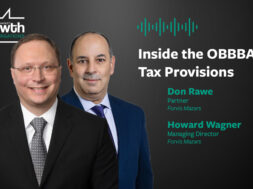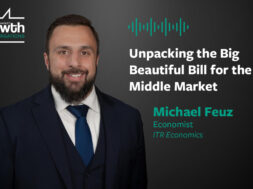Middle-Market Public Policy Roundup
The NLRB issued its final rule on the joint-employer standard, the Small Business Administration plans to improve private equity access, and the HFSC released its March hearing schedule.

In this week’s roundup, we look at the National Labor Relations Board, which issued its final rule on the joint-employer standard. We also offer a summary of the Small Business Administration’s plan to assess how it can improve the flow of private equity capital to small companies. In addition, we’ve published the House Financial Services Committee’s March hearing schedule.
NLRB Issues Final Joint-Employer Rule
The National Labor Relations Board issued its final rule about the status that determines whether an employer may be responsible for employees hired by contractors or franchisees.
The NLRB restored the joint-employer standard on Feb. 26 that it applied for several decades prior to the 2015 decision in its case involving Browning-Ferris Industries. The agency says the new rule will bring greater precision and clarity to the joint-employer definition.
“With the completion of today’s rule, employers will now have certainty in structuring their business relationships, employees will have a better understanding of their employment circumstances, and unions will have clarity regarding with whom they have a collective-bargaining relationship,” NLRB Chairman John F. Ring said after the final rule was announced.
The joint-employer standard determines whether a business is responsible for the employees of another employer, such as a contractor or franchisee. Joint employers may be potentially liable for unfair labor practices committed by the other party, and both are subject to union picketing or other economic pressure if there is a labor dispute.
To be considered a joint employer under the final rule, a business must possess and exercise substantial direct and immediate control over one or more essential terms and conditions of employment of another employer’s employees.
The NLRB issued a notice on the joint-employer rulemaking in September, and the final rule will be effective starting April 27.
The Department of Labor issued a final rule on the joint-employer standard with similar provisions in January, which is scheduled to come into effect on March 16.
SBA to Appraise Private Equity Investment
The Small Business Administration is looking to improve the flow of private equity capital to help small businesses finance, grow and modernize their operations.
In a report published Feb. 20, the SBA said it will conduct a comprehensive program evaluation of its Small Business Investment Company Program, or SBIC, to help the agency determine what changes could be made to improve the program’s relevance in “modern capital formation, private capital markets, and a mature private equity industry.”
“The evidence will help the SBA review its policies for alignment with the Small Business Investment Act to stimulate and supplement the flow of private equity capital and long-term loan funds to small businesses when such capital is not available in adequate supply,” wrote the report’s authors.
The SBA will conduct a survey to describe the current state of private equity investing. The study will also provide geographic detail about where investment capital is needed, such as in rural areas.
Briefs
Pompeo Wants Africa to Open up to U.S. Investment
U.S. Secretary of State Michael Pompeo delivered a speech to African leaders in Ethiopia on Feb. 19, where he encouraged them to improve business conditions that would attract U.S. investment.
“And so not only will you see capital… but you’ll see capital that is affordable,” he said. “Whether it’s a bond fund or a leveraged financial institution or angel investor or a private equity fund, the rate of return that they’ll demand turns on the risk that they perceive.”
Experts say the speech underlines a growing interest by the U.S. to gain a foothold in African countries as competition gears up with China, which has invested billions of dollars in the continent in recent years.
The study will use data about debt, private equity, mezzanine debt, and information from other federal agencies, such as the U.S. Department of Agriculture, the Securities and Exchange Commission’s Division of Corporation Finance and the Federal Reserve Board.
The study is expected to be completed this spring.
Chairwoman Waters Announces March Committee Schedule
The chairwoman of the House Financial Services Committee, Rep. Maxine Waters, D-Calif., announced several hearings for the month of March:
- March 4 at 10 a.m. –The Subcommittee on National Security, International Development, and Monetary Policy will convene for a hearing titled “The Traffickers’ Roadmap: How Bad Actors Exploit Financial Systems to Facilitate the Illicit Trade in People, Animals, Drugs, and Weapons.”
- March 4 at 2 p.m. – The Subcommittee on Housing, Community Development, and Insurance will convene for a hearing titled “Drivers of Discrimination: An Examination of Unfair Premiums, Practices, and Policies in the Auto Insurance Industry.”
- March 6 at 10 a.m.– The Subcommittee on Consumer Protection and Financial Institutions will convene for a field hearing titled “Modern-Day Redlining: the Burden on Underbanked and Excluded Communities in New York.” This hearing will take place at the Jamaica Performing Arts Center in Jamaica, New York.
- March 10 at 10 a.m. –The full Committee will convene for a hearing titled “Holding Wells Fargo Accountable: CEO Perspectives on Next Steps for the Bank that Broke America’s Trust.”
- March 11 at 10 a.m. –The full Committee will convene for a hearing titled “Holding Wells Fargo Accountable: Examining the Role of the Board of Directors in the Bank’s Egregious Pattern of Consumer Abuses.”
- March 24 at 10 a.m. –The full Committee will convene for a hearing titled “An Examination of Secretary Carson’s Efforts to Undermine Affordable Housing in America.”
- March 24 at 2 p.m. –The Subcommittee on National Security, International Development, and Monetary Policy will convene for a hearing titled “A Review of Domestic and International Approaches to Digital Currencies.”
- March 25 at 10 a.m. –The Subcommittee on Investor Protection, Entrepreneurship, and Capital Markets will convene for a hearing entitled, “The End of LIBOR: Transitioning to an Alternative Interest Rate Calculation for Mortgages, Student Loans, Derivatives, and Other Financial Products.”
- March 25 at 2 p.m. –The Subcommittee on Oversight and Investigations will convene for a hearing titled “Holding Wells Fargo Accountable: Examining the Impact of the Bank’s Toxic Culture on Its Employees.”
- March 25 at 10 a.m. – The Subcommittee on Investor Protection, Entrepreneurship, and Capital Markets will convene for a hearing entitled, “The End of LIBOR: Transitioning to an Alternative Interest Rate Calculation for Mortgages, Student Loans, Derivatives, and Other Financial Products.”
- March 25 at 2 p.m. – The Subcommittee on Oversight and Investigations will convene for a hearing entitled, “Holding Wells Fargo Accountable: Examining the Impact of the Bank’s Toxic Culture on Its Employees.”
Are you an ACG member who enjoys reading the public policy roundup? Join our Public Policy Interest Group to receive even more in-depth coverage of federal policy activity impacting the middle market, as well as opportunities to help shape ACG’s advocacy efforts.

Benjamin Glick is ACG Global’s marketing and communications associate.


